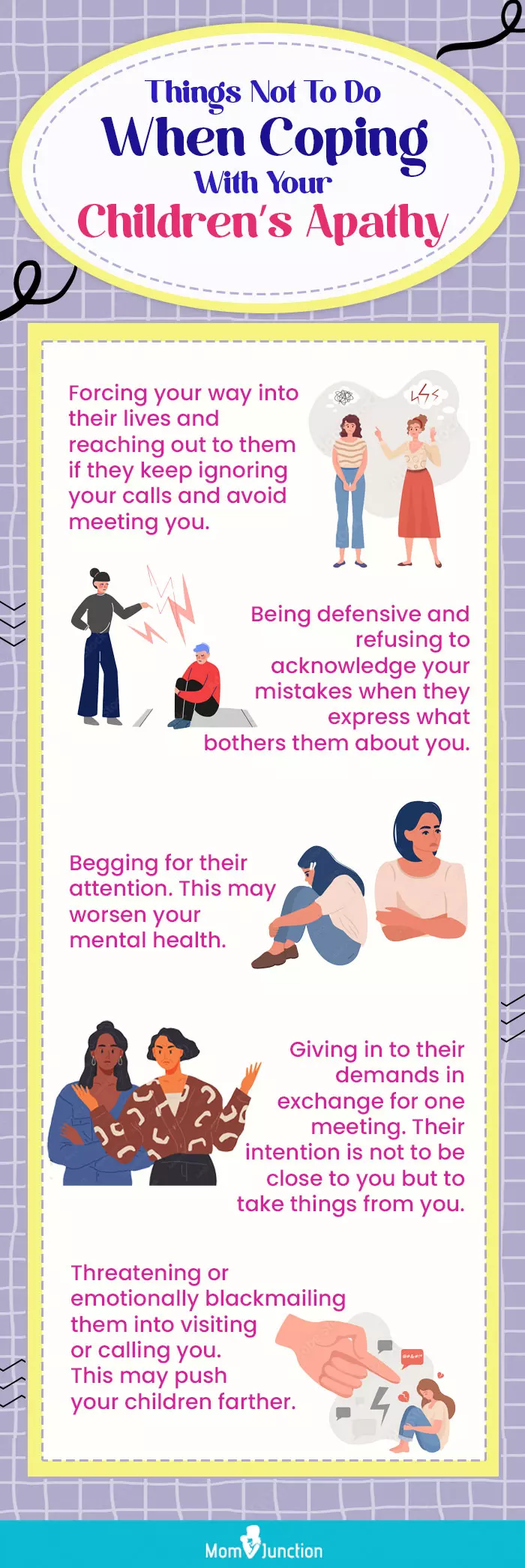

Shutterstock
It is not uncommon to witness grown children ignore their parents. However, this may be agonizing and heartbreaking to parents who love their children unconditionally. Grown children usually do not realize any fault in their actions while constantly giving silent treatments to their parents. Most children tend to put all the blame on their parents. Even worse, they feel that their parents deserve this kind of treatment. It is commonly observed in intergenerational relationships.
If you are a parent who can relate to this emotion, don’t worry, you may still manage the problem and transform how your child feels. Keep on reading to learn more about possible reasons grown children ignore their parents and ways to fix this family issue by improving parent-child relationship.
Key Pointers
- Many grown-up children cut off their relationships with their parents for misunderstandings.
- Some children may avoid parents if they interfere with their married life or judge their spouses.
- Take the initiative to stay in touch and reach out to support groups if you feel ignored by your children.
Why Do Grown Children Ignore Their Parents?
A grown child could ignore their parents for various reasons. While these reasons may seem valid to the child, leading them to cut off ties from their parents, they are not always plausible and are generally misunderstandings that can be cleared up with a few parent–child sessions. Here are a few probable reasons why your grown child could be ignoring you (1).
- Favoritism: When you have more than one child, you may try your best to be fair and love your children equally. However, at some point in your life, you may find that one of your offspring feels you neglect them. This could lead to bitterness later on in life.
- Childhood resentments: Some children cannot overlook a single criticism or slight, and it is difficult for you, as a parent, to watch your behavior constantly. Childhood resentments can be another underlying reason why your child feels emotional distance and animosity towards you in adulthood.
- Unwelcome advice: If you offer unsolicited advice even when they can make their own decisions, they may feel that you are disregardful of their opinions. Although your advice may be well-meant, at times, it is better to take a step back and let your children learn from their own mistakes.
Grown children may feel the need to escape from you if you keep advising them and ideally from controlling parents. Parents often expect their adult children to act a certain way, which can cause misunderstandings and lead to more distance between them. After a certain age, you need to let them decide to make decisions. This is how Ashish Gupta, a son and an employee at Google feels. Sharing a similar experience, he says, “As I grew up, I started finding my parent’s advice less and less relevant. By the time I graduated from college, I almost resented my parents and felt that they are too controlling — in retrospect, I can tell that they weren’t, but it felt that way back then. It was a welcome relief to move to the USA where I became in charge of my life completely (i).”
- Interfering in their married lives: You may be trying to be the doting grandparent by helping in parenting their children, but it can come off as slighting them and meddling in their family life. Or if you pass a comment on their spouse, you could be considered judgmental and disrespectful.
 Do remember
Do remember- Ignoring boundaries: Once your child is an adult, you should be a little cautious and make sure you do not cross some boundaries, even if you have their well-being at heart. It shows disrespect towards their feelings. Respect their choices and values, let go of control and power dynamics at a certain age to maintain a healthy parent-child relationship.
Texas-based psychologist Dr. Krista Jordan opines, “Many young adults struggle to negotiate their needs and wants as relationships evolve with their parents. They may find it nearly impossible to balance their growing need for independence with the complexities of having parents who are not emotionally healthy.”
Any of these reasons can lead to a feeling of discontentment in your relationship and eventually lead your child to ignore you.
Signs Your Grown Children Are Ignoring You
Parenting has its share of ups and downs. Look out for these signs that indicate your adult child is ignoring you.
- Rare or occasional meetings: Even though your grown child is now independent and does not need much support from you, it shouldn’t stop you from enjoying each other’s company over lunch or just a walk in the park. However, if your child goes from frequently visiting with plans for camping trips and visits to movies or games to rarely making an effort, it indicates emotional distance. Further, if your meetings have become less frequent, rushed, or obligatory, it may suggest that you are no longer a priority in your child’s life.
- Avoiding family occasions: Imagine a situation where your child has begun coming up with last-minute excuses to skip family vacations, tends to arrive late and leave early during gatherings, and shows deliberate disrespect for shared traditions. When a grown child starts neglecting you and creates flimsy excuses to avoid being part of family gatherings time and again, you can sense they are doing it on purpose to avoid being with you. And if they have stopped spending Christmas or Thanksgiving with you, they probably do not value their time with you.
- No calls: Thanks to mobile phones and the Internet, we can be in our children’s lives constantly, no matter which part of the world they are in. Some children may go from calling or texting every day to contacting only when they have a need. They may also disconnect from you on social media, leaving you looking for excuses to regain your connection and assurance that they are well.
However, if you are the only one picking up the phone to check on your child, it shows that your child neglects you. They might call you, but only when they need your money or favor. They might send texts disrespecting you in group chats. If your adult child has unfollowed you or stopped talking to you on social media, it might mean they want some space. - Actions that show rebellion: Usually, adult children are wise enough to take constructive advice from their experienced aging parents. However, if they disregard your advice and do the opposite, often overlooking their well-being, it is a sign of rebellion. For instance, your child suddenly started going against their values while complaining about being controlled when you check on them. They are also consistently dismissing well-meaning advice and ignoring your experience. It indicates they are trying to forgive you.
- You hear about them from others: If your grown child does not bother to tell you about the essential events in their lives, such as pregnancies, relocations, and new jobs, and you get to hear their news from someone else, know that they do not value your presence in their life and do not consider you a part of their family. Sometimes, such instances may be valid for one parent, where one parent gets to know certain information from social media and mutual friends while the other receives the details firsthand. This form of communication makes the parent feel excluded from their child’s life.
 Point to consider
Point to considerWhat Happens When Grown Children Ignore Their Parents?
The feeling that your grown child does not love you and does not want to have anything to do with you can be unbearable. The following are a few things that you could experience as a consequence of your children ignoring and disregarding you (2).
- Feeling judged: You may feel everyone around you is judging you and your parenting methods. You may feel disrespected by everyone. This could affect your relationship with the people around you.
- Depression: As people get older, family ties become more important. So, keeping in touch with their adult children is crucial for aging parents. If their children ignore them, they can fall into depression. This emotional strain can cause serious mental health issues, like anxiety and feeling worthless, as parents deal with the loss of their family relationships.
- Sense of mourning: When your adult children cut you out of their life, it can feel like you have lost them, which could lead you to experience prolonged bouts of mourning. It is difficult to resolve these feelings due to the uncertainty in the relationship.
- Tough family holidays: What were once happy occasions become days filled with unhappy moments because of noncohesive family dynamics. . Family celebrations bring more sadness than joy when parents miss their children.
- Caregiving problems: Since many senior parents are dependent on their children for a major part of their caregiving, a break in family ties leads to complications in arranging for the appropriate care they require. as children ignore their adult responsibilities.
- Guilt: Parents who have been alienated by their adult children can be consumed with guilt. They may feel they have not done enough for their children. and start questioning their parenting style.
What To Do When Your Children Ignore You?
Florida-based marriage and family therapist Jessica Jefferson says, “Children tend to distance themselves from parents when they feel their needs for a healthy relationship aren’t being met. As parents, the best response is to respect their boundaries, reflect on any behaviors that may have contributed to the distance, and focus on making positive changes for when they’re ready to reconnect.”
With no communication from your child, it can get extremely difficult to cope with your feelings. Nevertheless, you need to manage your anxiety and do certain things to take care of your mental health and put things in perspective.
- Let go of the anger: It is only natural that you feel betrayed and angry towards your child, but you need to take a step back and calmly look at the situation from an outsider’s point of view. This will help you let go of the anger and understand what is bothering you. Do not let outsiders fuel your anger against your child, as they may tend to blame your child for what you are going through. A few parent–child sessions can also help with conflict resolution.
- Stay in touch: Since your child is cutting off ties and not you, you need to continue taking the initiative to reach out and let them know you are thinking of them. Keep sending them messages, reminding them you love them and will always be there for them. It’s important to encourage open conversations. Parents should share their feelings without blaming and let their children talk about their views too.
- Reach out to support groups: Consider joining a support group for emotional support. It can help you share your feelings with people going through the same phase in their lives. A study by researchers from the University of the West of England indicated that individuals who joined support groups following a familial estrangement experienced reduced loneliness, shame, and psychological distress (3). You should also make it a point to stay connected with friends and family who understand the situation to not feel completely isolated.
- Forgive: If your child does reach out to you, be ready to forgive and let go of any hard feelings you may have. Focus on making yourself a better person and changing yourself so that you can work to improve your relationship with your child. by understanding their attachment styles and fixing the unresolved issues.
 Do remember
Do remember- Empathize and listen: Be ready to open your heart to your child. Listen to their viewpoint with an open mind. Even if you disagree and find it difficult to take the criticisms, prepare yourself to empathize and apologize rather than defend yourself. The fact that you are ready to listen and are not showing anger will go a long way in mending your relationship. Also, make them understand the ways to respect parents.
Frequently Asked Questions
1. What should parents never say to their children?
Things parents should never say to their children include:
- I wish you were never born.
- You will not get a dessert until you finish dinner.
- Don’t act like a baby.
- Why can’t you behave properly?
- If I were you, I wouldn’t do such a thing.
2. How long does the estrangement last?
Estrangement is the breaking apart of families, which may last for a short time or a long time, depending on the situation that led to it. If family members come together to resolve their issues, the relationship may survive. However, if one person wants to reconnect but the other doesn’t, estrangement may continue for a long time.
3. Is it ever appropriate for a grown child to ignore their parents?
A parent-child relationship is complex, and making a blanket statement about when ignoring parents is appropriate and when not is challenging. Sometimes, maintaining distance from parents, especially toxic parents, might be essential to ensure one’s mental well-being. However, parents and children should generally resolve every issue with open communication. Ignoring parents should not be the default response to solving problems.
4. Can strained relationships between grown children and their parents ever be repaired?
Repairing strained relationships between grown children and parents is possible, provided both parties are willing to reconcile. If they are willing, having open and honest communication can help clear misunderstandings and find a middle ground to resolve differences. Taking responsibility for hurtful actions or behavior and forgiving the other party for their faults can make reconciliation easier. If there are any deep-rooted issues, seeking professional help may be beneficial. Remember, mending strained relationships is a delicate issue, so it should be addressed with utmost patience and respect.
Grown children ignoring their parents can be deeply painful and distressing for the latter. However, mourning over your child’s behavior and feeling depressed and dejected is of no use. Instead, try to manage your anxiety and disappointment by putting things in perspective. Use positive coping strategies, such as reaching out to support groups to aid in emotional healing. You may also reach out to a professional for family therapy or counseling. Your child ignoring you will still hurt, but your efforts to stay positive and happy will bring your life back to normalcy eventually. After all, overcoming pain and grief is essential to achieving peace.
Infographic: What Not To Do If Your Grown Child Ignores You?
As children grow older, start working, and build their own families, they may not want you as much and intentionally or unintentionally avoid you. It can be hurtful, but you must not act out of your overwhelming emotions since it may lead to a situation that can hurt you further. This infographic can help you understand the things you shouldn’t do. Illustration: Momjunction Design Team
Illustration: Reasons Grown Children Ignore Their Parents & Tips To Deal
Image: Dall·E/MomJunction Design Team
Learn how to respond to your grown child’s disrespectful behavior with 3 powerful strategies. Discover how to stay calm and maintain your authority in difficult situations.
Personal Experience: Source
MomJunction articles include first-hand experiences to provide you with better insights through real-life narratives. Here are the sources of personal accounts referenced in this article.
i. Is it pointless to rely on parents for advice after a certain age?;https://selfishaltruist.medium.com/is-it-pointless-to-rely-on-parents-for-advice-after-a-certain-age-606dc56c9e3f
References:
- What to Do When Your Adult Kids Ignore You.
https://www.aarp.org/home-family/friends-family/info-2023/when-your-adult-kids-ignore-you.html - What To Do When Your Grown Child Ignores You (And Breaks Your Heart).
http://www.maiamoms.org/grown-children-who-ignore-their-parents.html - Lucy Blake, Becca Bland, and Helen Gilbert; (2022); The efficacy of a facilitated support group intervention to reduce the psychological distress of individuals experiencing family estrangement.
https://pubmed.ncbi.nlm.nih.gov/36108542/
Community Experiences
Join the conversation and become a part of our nurturing community! Share your stories, experiences, and insights to connect with fellow parents.
Read full bio of Shreshtha Dhar
- Jessica Jefferson is a licensed marriage and family therapist and a certified perinatal mental health professional with eight years of experience. She graduated with a bachelors in Psychology from the University of Miami, a masters in Psychology in Education from Teachers College, Columbia University and a masters in Family Therapy from Nova Southeastern University.
 Jessica Jefferson is a licensed marriage and family therapist and a certified perinatal mental health professional with eight years of experience. She graduated with a bachelors in Psychology from the University of Miami, a masters in Psychology in Education from Teachers College, Columbia University and a masters in Family Therapy from Nova Southeastern University.
Jessica Jefferson is a licensed marriage and family therapist and a certified perinatal mental health professional with eight years of experience. She graduated with a bachelors in Psychology from the University of Miami, a masters in Psychology in Education from Teachers College, Columbia University and a masters in Family Therapy from Nova Southeastern University. - Dr. Krista Jordan received her PhD in Clinical Psychology in 1996 from the University of Texas Southwestern Medical Center at Dallas. She was certified by the American Board of Professional Psychology in 2002. Dr. Jordan has worked in private practice as well as major hospitals and clinics for over 30 years and continues to conduct research and publish in scientific journals. She utilizes psychodynamic psychotherapy as well as attachment theory to guide her work with individuals and couples.
 Dr. Krista Jordan received her PhD in Clinical Psychology in 1996 from the University of Texas Southwestern Medical Center at Dallas. She was certified by the American Board of Professional Psychology in 2002. Dr. Jordan has worked in private practice as well as major hospitals and clinics for over 30 years and continues to conduct research and publish in scientific journals. She utilizes psychodynamic psychotherapy as well as attachment theory to guide her work with individuals and couples.
Dr. Krista Jordan received her PhD in Clinical Psychology in 1996 from the University of Texas Southwestern Medical Center at Dallas. She was certified by the American Board of Professional Psychology in 2002. Dr. Jordan has worked in private practice as well as major hospitals and clinics for over 30 years and continues to conduct research and publish in scientific journals. She utilizes psychodynamic psychotherapy as well as attachment theory to guide her work with individuals and couples.
Read full bio of Rohan Sinha
Read full bio of Akshay Nair
Read full bio of Ratika Pai





























